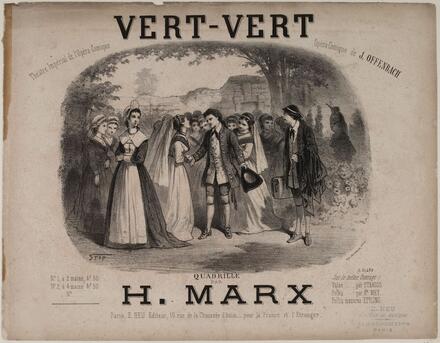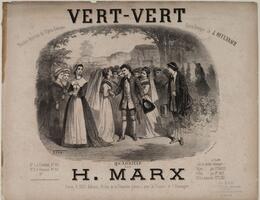Vert-Vert

Opéra comique in three acts premiered at the Opéra-Comique on 10 March 1869.
The libretto by Jacques Meilhac and Charles Nuitter was taken from the poem Vert-Vert ou Les Voyages du perroquet de la visitation de Nevers by Jean-Baptiste Gresset, written in 1734 (an extract of which is quoted in the first scene). This short text describes the adventures of a pious parrot, taken in by the Visitandines of a convent in Nevers, who is able to talk like a Christian. The parrot is then sent to another convent in Nantes by boat, on which he learns the coarse language of the sailors. By the time they arrive at their destination, the parrot can curse like a sailor, much to the indignation of the nuns who send him back to Nevers, where he proves unable to relearn Latin. Gresset’s poem inspired many works of literature, theatre and art during the 19th century. For example, the parrot in Flaubert’s Un cœur simple can be seen as an allusion to the poem, a copy of which the writer had on his bookshelves. Gresset’s text served as a point of departure for two other comic operas—one by Dalayrac, performed at the Salle Favart in 1790, the other by Gautier, given in 1800 at the Théâtre des Jeunes Artistes—and a comédie-vaudeville, premiered at the Théâtre du Palais Royal in 1832, which was the direct source for this work of 1869. In 1851, a ballet-pantomine with the same title was also performed at the Paris Opéra. Despite the popularity of several of its numbers, particularly the “Key Duet”, which was compared to the “Watch Duet” in Die Fledermaus, and a barcarolle sung by the hero/bird, Vert-Vert was a qualified success at the Opéra-Comique and was withdrawn after 58 performances.

